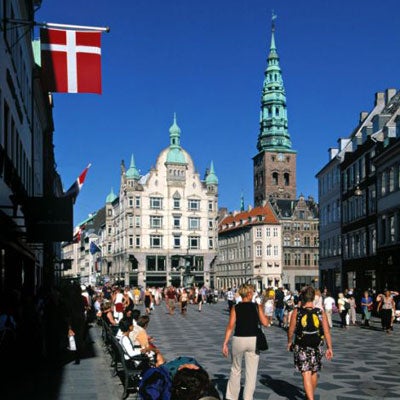Copenhagen, probably the best city in the world

For many it conjures up little more than beer and Lego, but Copenhagen has been crowned the best city in the world in a survey of global urban treasures.
The Danish capital was awarded top spot for its quality of life and status as a cutting-edge design centre, said the authors of the report, which looked at factors from the ease of buying a good glass of wine at 1am to the quality of architecture and the number of cinema screens.
Researchers at the London-based lifestyle magazine Monocle praised the city's compact planning, its "frictionless" transport system and infrastructure, as well as its contemporary buildings, top-notch restaurants and renewed focus on environmental issues. The last characteristic was crucial in Copenhagen's promotion from second place in last year's standings to first place in 2008, they said.
"As the planet becomes an increasingly urban place, delivering these life-improving essentials to cities big and small is proving more than a challenge. Radical environmental initiatives that pull cars off streets can do wonders, but can also kill off passing trade," said Tyler Brule, Monocle's editor-in-chief.
"New developments, designed to attract investment, can not only boost local fortunes but also drive out all those people that made the city interesting in the first place."
In a further accolade, Copenhagen was proclaimed the design capital of the world, with researchers hailing the return of a buzzing scene which had not seen such creativity since its heyday in the 1950s and 60s.
Cities usually considered big-hitters were notable in their absence. Neither New York nor London – which was lambasted by philosopher and writer Alain de Botton for its "bland" developments – made it into the 20 featured locations. To be thus neglected by Monocle magazine, which since it was set up 18 months ago by the Wallpaper* founder Mr Brûlé, has established itself as the observer of things cool and contemporary, will come as a shock to both cities.
Other locations that fared better in the survey included Munich and Tokyo, which came second and third respectively.
Paris won the award for best global city, crediting its maverick mayor, Bertrand Delanoe, with having ushered in a new era of free-thinking in the form of innovative initiatives such as the bike-sharing Vélib scheme. President Nicolas Sarkozy was also praised for having revived the city's reputation as an international political centre.
For fledgling entrepreneurs, Madrid was named best business city after shaking off its reputation for bureaucracy. The survey said the Spanish capital was now free from the red tape which once plagued it, and its relaxed working hours make it a fun place to work.
Researchers advised the more artistic traveller, meanwhile, to head to Berlin, which they labelled the world's best for culture.
The German capital's art galleries have made it an "unparalleled" cultural hub, the magazine said, adding that cheap studio space and a 24-hour scene were attracting artists and designers from around the globe.
The winners: Best cities for quality of life
1 Copenhagen
2 Munich
3 Tokyo
4 Zürich
5 Helsinki
6 Vienna
7 Stockholm
8 Vancouver
9 Melbourne
10 Paris
11 Sydney
12 Honolulu
13 Madrid
14 Berlin
15 Barcelona
16 Montreal
17 Fukuoka
18 Amsterdam
19 Minneapolis
20 Kyoto
*Best global city : Paris
*Best business city: Madrid
*Best cultural city: Berlin
*Best design city: Copenhagen
*Best retail city: Fukuoka
'Stroll' through history – without the fumes
By Simon Calder, Senior Travel Editor
Scale: that is the secret of Copenhagen. The Danish capital has sufficient critical mass to power a thriving cultural scene from sculpture to jazz. It is big enough to embrace all the benefits of diversity.
Yet, as the principal city of a scattered archipelago that (often) shivers in the Baltic breeze, Copenhagen maintains a human scale. This becomes most evident as you walk along Stroget, the main civic drag (whose name is agreeably pronounced "stroll"). While the Champs-Elysées, Oxford Street and Fifth Avenue are choked with traffic, Copenhagen's principal artery has been pedestrianised for decades – boasting the longest car-free thoroughfare of any European city.
Liberated from traffic, the pedestrian is free to appreciate the cultural variety of the city through the centuries. The architecture is sometimes shocking in the best sense, but much of the civic history is preserved – such as the 17th-century Round Tower (still a functioning observatory), and a waterfront that has grown from mercantile hub to a locale for civilised indulgence.
The water lends the city a certain serenity, but don't be fooled – it remains at the cutting edge of art, music and design. Copenhagen is also the home of, probably, the most philanthropic lager in the world. The profits from Carlsberg beer are expended on a wide range of good causes, including the Ny Carlsberg Glyptotek: a beautiful sculpture gallery that also holds a fine Gauguin collection, and a glass-domed winter garden. Here, you can buy a Carlsberg and toast your good fortune at finding a city so acutely in tune with humanity.
Join our commenting forum
Join thought-provoking conversations, follow other Independent readers and see their replies
Comments
Bookmark popover
Removed from bookmarks